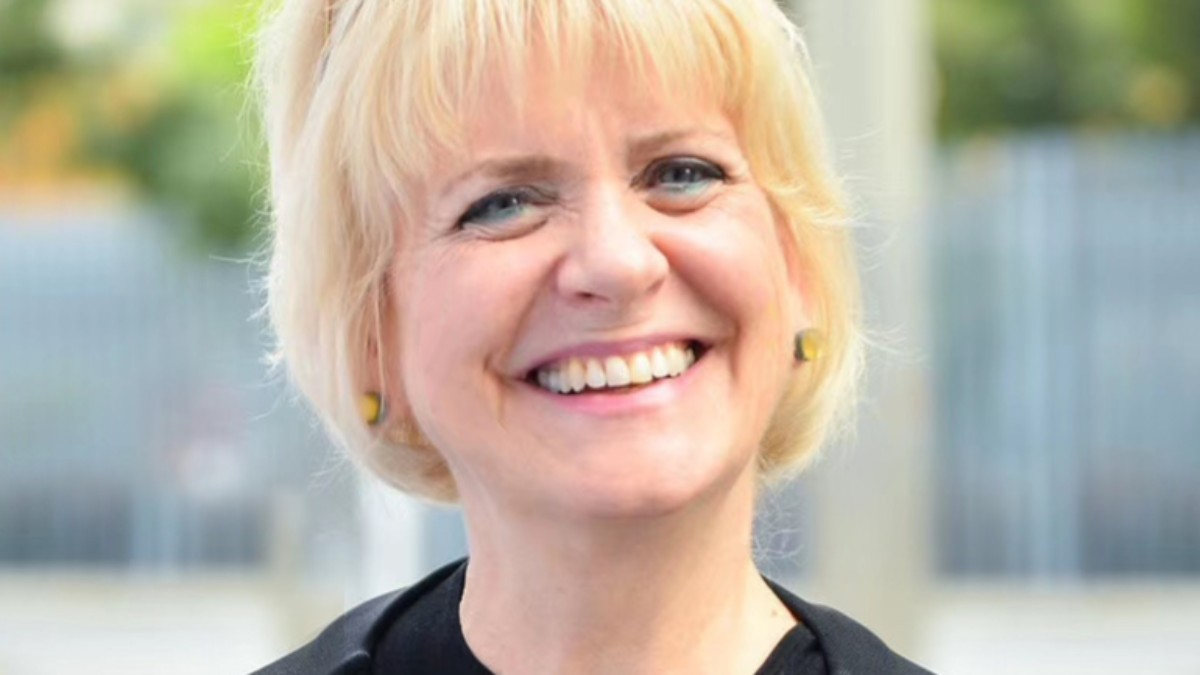
I am Elisabeth P. Montgomery, Ph.D. I am the Producer of ruth weiss: The Beat Goddess, a full-length feature film released in 2019, winner of more than 20 film awards. The story is a tale of the life of a genuine “original” – a woman that defies time with her total commitment to poetic art through creative persistence. We place her in the Beat Generation because that is where she landed in San Francisco in the 1960s as the violence of WWII gave way to an alternative cultural revolution. Uncovering the long life of poet ruth weiss ( 1928–2020) became a voyage of an American refugee immigrant and her passage from destruction to renewal and beauty over and over again.
Since the 1980s, I have produced and directed documentary films. Filmmaking is not my full-time work; I consider it a tool to capture and tell stories. I grew up in Appalachia and felt an affinity with the traditions of oral history, which gives a range of activities in telling stories through demonstrations, songs, and awareness of the emergence of experiences with the Director’s intentional curiosity.
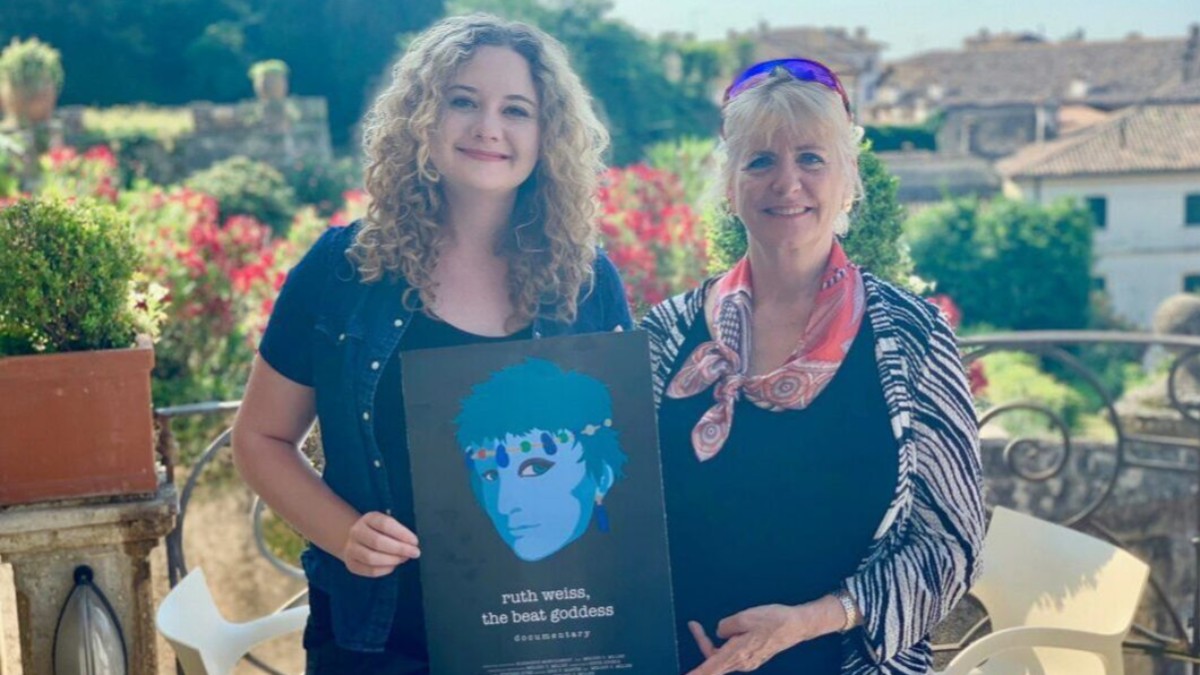
I dedicated my life’s work to community empowerment through education and economic development. I had a lot of success and joy working with high school youth and young people in need of creative exploration. It became natural to use the camera to explore and document the experiences. When I met ruth weiss in 2008, I had already been an avid reader of the Beat Generation poets. I was an early Twitter adopter, and my handle is Beatgenlover. Poet Lawrence Ferlinghetti opened City Lights Bookstore in San Francisco in 1953, and it remains a beacon for free speech and poetry. When the Beat Museum opened in 2002 across the street from the iconic City Lights, I frequented the museum in hopes of rubbing elbows with these poets, many of whom I greatly admired.
The Beat Museum fundraiser “take a Beat poet to lunch” was a fundraising auction that kept the doors open. I chose ruth weiss and paid to take her to lunch and talk about her work. It turns out that we had a lot in common. Over the next decade, ruth and I became good friends and talked about once every two or three months even though I relocated to mainland China for work. I tried to see her reading her poems when I was back in the Bay Area.
Watch the trailer for ruth weiss: the beat goddess produced by Elisabeth P. Montgomery
At times I tried to see the videos of her performances, but usually, the sound and video quality proved terrible. At one point in 2016, I was almost full-time in Asia, so I asked my husband and friend, Melody C. Miller, a filmmaker, to film ruth’s performance at the Monroe club in North Beach. Melody and Eugene met ruth, and both became huge fans. When I was home in 2018, Melody and I began recording ruth earnestly.
indieactivity: What is your experience working on the story, the screenplay, the production, the premiere, and the marketing?
Elisabeth P. Montgomery (EPM): My experience in producing the documentary was to allow Melody Miller free reign as the Director and Cinematographer. I concentrated on creating a feature-length documentary film, which included paying for the equipment and services (accounting, legal, business, taxes) needed to ensure the movie is protected and seen in as many festivals as possible to guarantee that the story is known.
How did you put the crew and cast together? Did you start writing with a known cast?
Elisabeth P. Montgomery (EPM): The “crew” included the Director/Cinematographer and any assistants she might need during the filming. For example, we rented The Monkey House, a well-known sound recording studio in Berkeley. California to make sure we filmed a private and excellent quality poetry performance. The cast is ruth weiss; her three musicians, including a saxophonist, a stand-up bass player, and a drummer, use a redwood log as their instrument.
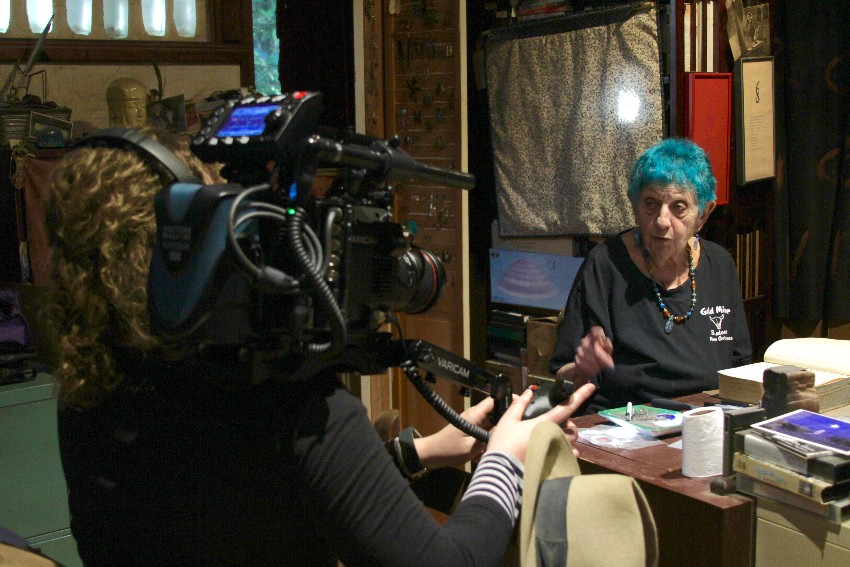
What and how long did it take to complete the script? (was it a team effort, or was it solo?)
Elisabeth P. Montgomery (EPM): The documentary does not follow a script but is a chronology of ruth’s passages and documents different times in ruth weiss’ life. The Director/Cinematographer created the original format and “script,” but she encouraged input from other artist contributors to the film.
It took about one year to put the documentary together and then develop it metaphorically, using dance and animated aspects for the story-telling. As a Producer, I could critique the final extended version draft of the film and discuss aspects to expand or cut. Ultimately, I let the Director find the right ways to combine the elements she developed for the film.
When did you form your production company – and what was the original motivation for its formation?
Elisabeth P. Montgomery (EPM): We formed the Production company in 2018 just for ruth weiss: The Beat Goddess film. In creating the company around the film, there is an advantage to film rights and taxes. Note: My first film company was Gringa Maxima Productions, and I produced films under that company from 1986 – 2000.
What was the first project out of the gate?
Elisabeth P. Montgomery (EPM): At present, the film production company ruth weiss: The Beat Goddess is the first out of the gate under this name.
Note: In 1986, my first film was Las Marias: Our Way of Being, a documentary about the history of Colombia’s first credit union. Filmed in Bogota, Colombia, the story documents women orphans from the early 1900s educated and trained by Padre Campamor as accountants for Colombia’s first Credit Union known as the Fundacion Social – Caja Social de Ahorros. Modeled after the Mondragon Commune in Spain, the Caja was a bank whose profits benefited the local community.
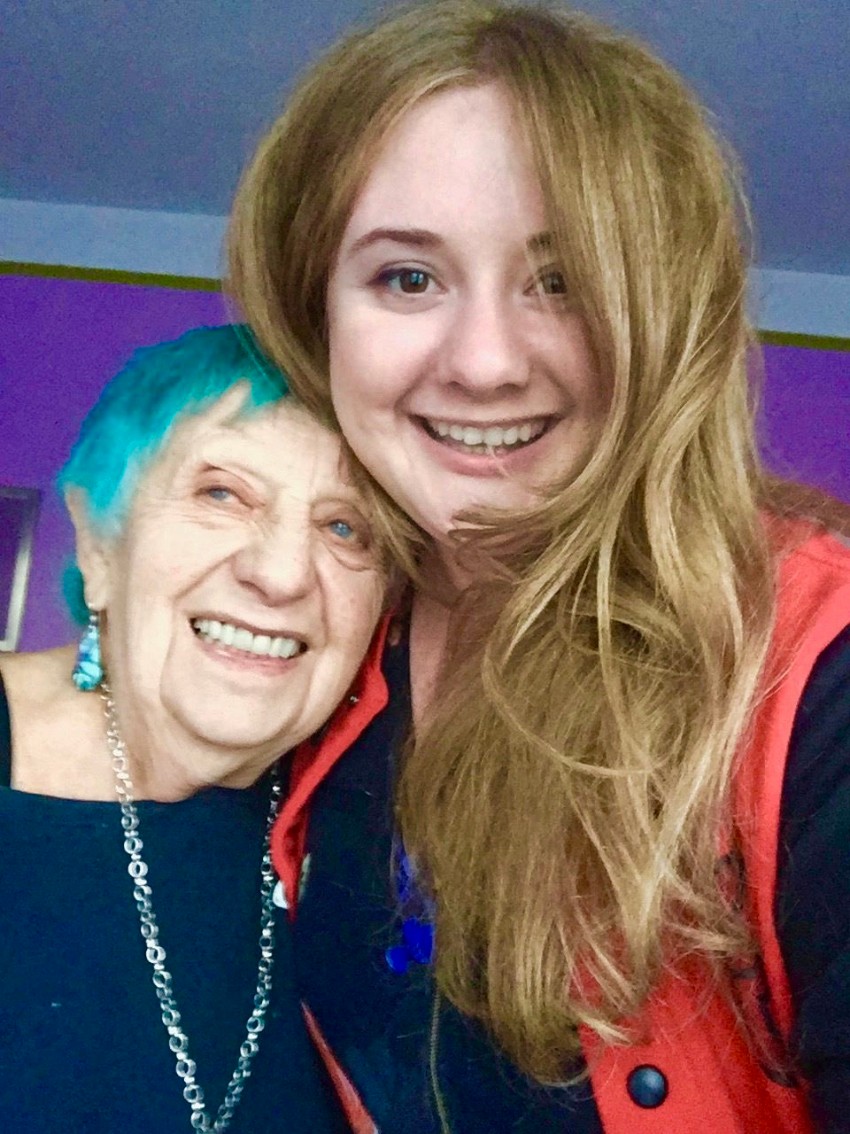
During the film production, what scene (that made the cut) was the hardest to shoot? And why?
EPM: The dancing scenes were some of the hardest because of the various location challenges. There were three dancers – a girl child in the woods, a “city dancer,” and a “desert dancer.” The first was my nine-year-old granddaughter out in the redwoods, which proved to be more time and directing than initially thought. Although filming in the summer in San Francisco, it is cold and windy during that season for the city dancing scenes. The desert dancer performed in the heat and harsh sun. The dancers are my favorite part of the film.
What worked better in this latest production that mightn’t have worked so well in the last one you did?
EPM: The production had a high commitment to film quality and artistry in this film. Many of my most recently produced films were for more commercial purposes.
You must have several hats on this film, the measure of your input required intellect, effort, tenacity, and skill (…you know better). What did it take you to put out all these qualities to get the film done?
EPM: I had one significant role as the Producer because Director Melody Miller handled many details for developing the film and maintaining relationships with people to get it done. However, some of the “hats” I played were to host groups and parties that facilitated the film’s screening before its release to create a lot of energy for the story. After ruth weiss died in 2020, I co-founded the ruth weiss Foundation to continue awareness of ruth’s story and poetic work by awarding grants to other poets. We are in the second year of the foundation grants, and we hope this work will achieve its goals.
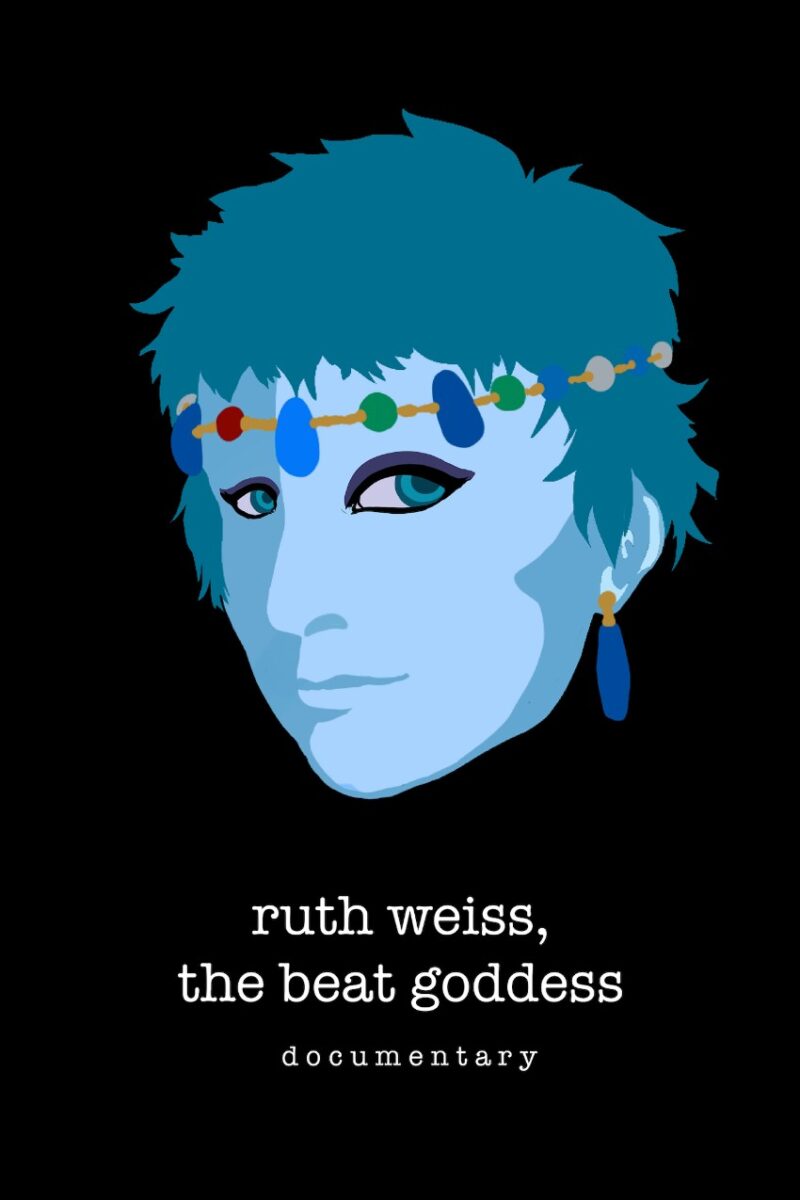
What about independent filmmaking and the business do you still struggle with?
EPM: Independent filmmaking requires a ton of resilience in terms of time, funds, creativity, and working relationships. All of these aspects come together when the story is remarkable and feels essential, but the most significant struggle remains the time spent from start to finish, which is often many years.
Where do you think your strengths lie as a producer?
EPM: Producing is easier for me when working with a director in whom I have a lot of confidence, and we cooperate to complete the work. My strengths as a producer revealed my commitment and “never give up” attitude. When facing adversarial situations, I balanced my emotional integrity in every challenging case. I maintained the objective of making the best impression of professionalism and artistry for the film’s sake. I also kept finding the best professionals so we could face any hardships.
Let’s talk finance, How did you finance the film?
EPM: I financed the film with my independent money earned from prior real estate investments.
How much did you go over budget? How did you manage it?
EPM: I had a budget per year. Some years required more funds than others. We encountered more legal issues to pay for in the fourth year, which did go over budget, but I earned additional funds from a second consulting job. I managed to focus on getting the film completed without going over budget.
How important is marketing? Do you think a project can make a dent without it nowadays?
EPM: Marketing is vital to filmmaking because the product depends on being seen, used, and watched repeatedly. We created standard social media marketing plans for the film, first with national and international film festivals and now with a public relations campaign. While we can take on some of the aspects of marketing, the need for great articles, literary critiques, and higher-quality dialogues about our film becomes essential.
Tell us about marketing activities or efforts on this project – and how they worked or didn’t work?
EPM: For marketing the film, we have a combined team of social media and foundation promotion that contribute to a database of not only film venues but also educational and cultural venues such as libraries, museums, and community centers. We are working closely with the Beat Museum as they make a trek across the country to promote and educate the country about the Beat Generation leader Jack Kerouac for his 100th anniversary. The Beat Museum will hold lectures on Women of the Beat and Kerouac. And ruth weiss will be the leading featured female poet. Our goal is to hold many more film screenings, publicize the poetry grants, and have a lot of positive energy about everyone seeing the film and making comments (hopefully positive😊 rankings on IMDb.
What do you hope audiences will get from the presentation of your film?
EPM: I hope our film helps the audience become more courageous about their beliefs and stand up for what they believe in, as evidenced by how ruth weiss led her life. I want them to find the goodness that ruth discovered in people and situations that could have turned destructive but instead “magnetized” positivity and productivity.
What else have you got in the works?
EPM: I want to make a documentary about a legendary restaurant in Evanston, Illinois: Dave’s Italian Kitchen. I was the first waitress more than 40 years ago. The soundtrack for the next film will be original, and I will play harmonica on it.
Tell us what you think of the interview with Elisabeth P. Montgomery. What do you think of it? What ideas did you get? Do you have any suggestions? Or did it help you? Let’s have your comments below and/or on Facebook or Twitter.
Richard Green Documentary, ‘I Know Catherine, The Log Lady’: Premiere in NYC, LA May 9th
Lynchian Doc I Know Catherine, The Log Lady Makes Hollywood Premiere 4/17, Rollout to Follow
In Camera by Naqqash Khlalid Launch on VOD April 29
Naqqash Khlalid’s Directs Nabhan Rizwan. In Camera stars an EE BAFTA Rising Star Award Nominee.
2025 Philip K. Dick Sci-Fi Film Festival Award Winners Announced
Vanessa Ly’s Memories of the Future Awarded Best PKD Feature
Dreaming of You by Jack McCafferty Debuts VOD & DVD for April Release
Freestyle Acquires “Dreaming of You” for April 15th Release
Hello Stranger by Paul Raschid set for London Games Festival & BIFFF
The film Is set for an April 10th Premiere at The Genesis Cinema in London (LGF) and BIFFF
Daydreamers Official Trailer by Timothy Linh Bui: Released by Dark Star Pictures
Daydreamers Vietnamese Vampire Thriller – May 2nd release









